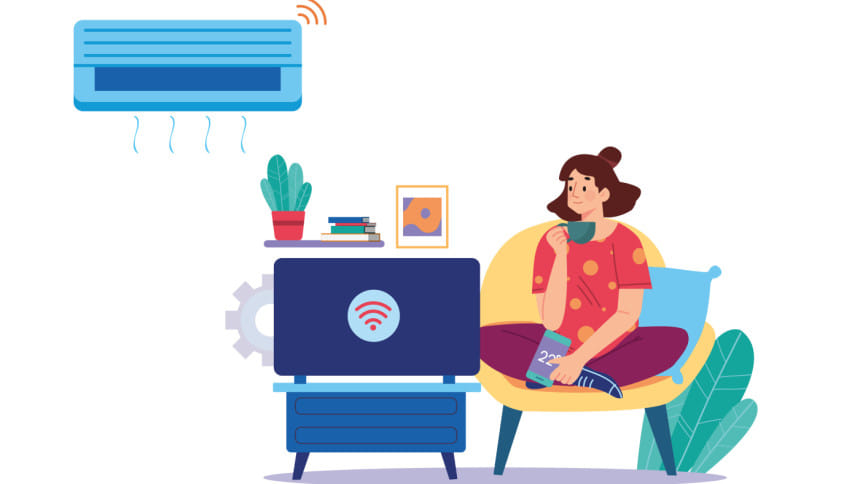Smart AC 101: A guide to modern cooling in Bangladesh

Once upon a time, the most we expected from an air conditioner was cold air. However, in today's Bangladesh, where rising temperatures and unpredictable power supplies collide with fast-moving digital lifestyles, smart air conditioners are offering more than just cool comfort. They're offering control, efficiency, and even cleaner air.
So, what exactly makes an AC "smart"? And why should Bangladeshi households and businesses care? Let's break down the technology shaping the next generation of cooling.
Wi-Fi control: The power in your pocket
One of the most sought-after smart features in air conditioners is Wi-Fi connectivity. A Wi-Fi-enabled AC allows users to control the unit via smartphone—from switching it on and adjusting the temperature to setting timers—whether they are stuck in traffic or simply too comfortable on the couch at home.
Smart models from all major AC brands in Bangladesh support mobile app control, offering flexibility and convenience. This is particularly valuable in Bangladesh, where load shedding and irregular work hours are common. Remote access helps reduce energy waste and ensures users return to a comfortably cooled home, not one that's freezing or overheated.
Energy monitoring: Track to save
Many smart ACs now come with built-in energy monitoring systems. These track your power usage in real-time and can even give suggestions to reduce your electricity bill. Some models will notify you if the temperature setting is using more power than needed or if the compressor is working inefficiently.
For Bangladeshi households battling high utility costs, especially during peak summer, this feature is more than just convenient; it's economically essential. In commercial settings, where multiple units run for long hours, smart tracking can lead to significant savings.
Walton has taken this further by integrating real-time electricity consumption data directly into their smart app. "Our customers can monitor how much power the AC is consuming – daily, weekly, or monthly – helping them make informed usage decisions," shares Engr. Ariful Islam, Head of Research & Innovation at Walton Residential Air Conditioner.
Your AC learns your habits
Artificial Intelligence may sound futuristic, but it's already here in many air conditioners. AI-integrated ACs learn your preferences over time. If you usually set the temperature to 26 degrees Celsius at night and 24 degrees Celsius in the afternoon, the AC can eventually begin to do it for you, automatically.
Some models go even further, adjusting cooling based on room occupancy. If you leave the room, the AC will slow down or switch off. Return, and it resumes. That's smart comfort paired with energy conservation.
Jamuna AC's 5D AI Inverter with intelligent "Follow Me" zone control utilises AI to detect the room temperature around the user and adjusts cooling accordingly, optimising both comfort and energy usage.
Voice control: "AC, turn on!"
For those using smart home systems like Google Home or Amazon Alexa, voice-controlled ACs are a seamless fit. Instead of fiddling with remotes or apps, just speak to control temperature, change modes, or switch off the unit.
While still emerging in the Bangladeshi market, this feature is gaining popularity among tech-savvy users and in smart office setups.
Smart diagnostics and maintenance alerts
Smart ACs can detect internal issues – like a dirty filter, low refrigerant levels, or fan problems – and send an alert to your phone. Some brands even connect directly with service centres, allowing technicians to diagnose problems remotely before arriving.
This is particularly useful in Bangladesh, where AC servicing can be inconsistent. Early detection means fewer breakdowns in the middle of a heatwave.
Local adoption and availability
Brands like Walton, Gree, Jamuna, Singer, Samsung and Haier have already begun offering smart AC models in the Bangladeshi market, with prices becoming more competitive. Local manufacturers such as Elite Hitech are also investing in R&D to make smart features accessible to a broader middle-class consumer base.
Retailers now bundle ACs with installation, servicing apps, and even smart home hubs. As the demand grows, especially in urban apartments and office spaces, smart ACs are no longer a luxury. They're fast becoming a practical necessity.
The takeaway
Smart air conditioners are doing more than cooling – they're connecting, learning, saving, and protecting. As climate challenges and energy demands grow in Bangladesh, smart cooling solutions are stepping in to make indoor life not just bearable, but better.

 For all latest news, follow The Daily Star's Google News channel.
For all latest news, follow The Daily Star's Google News channel. 



Comments